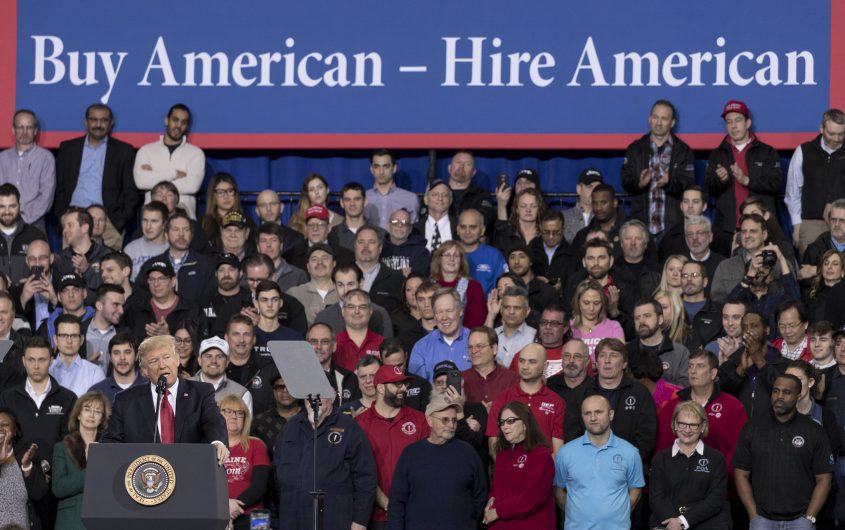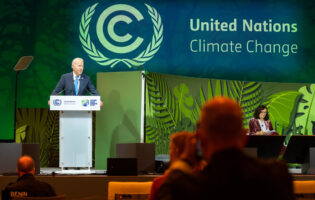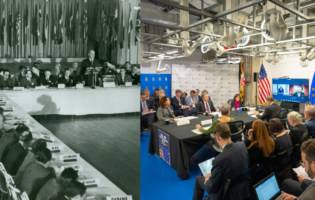
Official White House Photo by Shealah Craighead
Transatlantic Trade: Great Expectations and Low Chances for Success?

Garrett Workman
U.S. Chamber of Commerce
Garrett Workman joined the U.S. Chamber of Commerce in June 2015. His work focuses on promoting transatlantic trade and investment and regulatory cooperation. He actively supports the work of the Chamber’s U.S.-UK Business Council, promoting a minimally disruptive British exit from the European Union and strengthening the close economic relationship between the United States and the United Kingdom. Previously, Mr. Workman spent four years as associate director of the Global Business and Economics program at the Atlantic Council, where he led the Council’s advocacy efforts for the Transatlantic Trade and Investment Partnership (TTIP).
Originally from Phoenix, Arizona, Mr. Workman earned his BA degree summa cum laude in political science from the University of Arizona and an MA in transatlantic relations and political science from the University of North Carolina at Chapel Hill and Sciences Po in Paris.
He is a 2018-2019 participant in AICGS’ project “A German-American Dialogue of the Next Generation: Global Responsibility, Joint Engagement,” sponsored by the Transatlantik-Programm der Bundesrepublik Deutschland aus Mitteln des European Recovery Program (ERP) des Bundesministeriums für Wirtschaft und Energie (BMWi).
On July 25, U.S. president Donald Trump hosted European Commission president Jean-Claude Juncker in Washington in an attempt to bridge some of the many growing economic policy divergences between the United States and the European Union. To put it bluntly, expectations were low that the meeting would yield any productive outcomes. In fact, staffers for both sides hadn’t even drafted a joint press release or scheduled any public remarks.
The presidential meeting unexpectedly yielded an agreement to work toward eliminating tariffs on industrial goods, to boost U.S. exports of soybeans and liquefied natural gas to Europe, and to encourage regulatory cooperation in key sectors including pharmaceuticals, chemicals, medical devices, and services. Staffers scrambled to write down what had actually been agreed—careful to avoid any mention of the controversial issues that were due to fall outside the scope of the talks, including agricultural (a European demand), tariffs on cars (an American one), and public procurement (ditto).
Carving out some of the most difficult issues, which have long plagued American and European trade negotiators, seemed to make a lot of sense after the four-year-plus debates during the Transatlantic Trade and Investment Partnership (TTIP) discussions, which ended without an agreement. By agreeing that the two sides could make progress on important issues without needing to solve every single issue, a plausible path for success was laid out before the two governments.
By agreeing that the two sides could make progress on important issues without needing to solve every single issue, a plausible path for success was laid out before the two governments.
And yet, many of the same challenges remain. For one, there is a significant institutional mismatch between the United States and the European Union. In Washington, the presidential administration has significant leeway to set the agenda, especially in international relations. Moreover, there is considerable bipartisan agreement that transatlantic trade and regulatory cooperation should be prioritized. While the administration is legally bound to consider congressional and stakeholder input, all parts of the government are committed to making progress at the direction of the president.
By contrast, while the European Commission has ultimate jurisdiction over European trade policy, any new EU trade agreement is not only subject to the approval of the European Parliament, but the negotiation objectives must also be agreed unanimously by all 28 member states. With countries like France and Ireland hard-set against including agricultural provisions in this new transatlantic trade dialogue, it is up to countries like Germany with more directly at stake to find a compromise that everyone can live with. Just agreeing on the terms of the negotiating mandate will take several more weeks, and it has already been almost four months since the joint presidential statement. Complicating matters further, next year there will be significant changes in Brussels as the European Parliament is up for election in May, to be followed by a brand-new European Commission coming into office in the fall.
With countries like France and Ireland hard-set against including agricultural provisions in this new transatlantic trade dialogue, it is up to countries like Germany with more directly at stake to find a compromise that everyone can live with.
The ultimate hindrance—which could derail the transatlantic talks entirely—is the ongoing threat of potential unilateral U.S. tariffs on auto and auto part imports, including from Europe. President Trump has promised to act if there is not significant forward momentum in the transatlantic trade talks, quickly.
Imposing tariffs on European cars would, at a stroke, multiply the ongoing transatlantic trade dispute by a factor of ten. The existing tariffs on imported steel and aluminum, coupled with the European tariffs in response on key U.S. exports, are already having a significant impact. New tariffs on cars and the inevitable European response would make this dramatically worse. Not only would these new talks quickly dissolve, but new tariffs would further erode trust between the United States and EU at a time where we have so many growing, shared, global concerns.
Transatlantic partnership is desperately needed to reform and strengthen the WTO system for the next generation of trade disputes. America and Europe have common challenges dealing with Chinese and other state actors investing in strategic sectors with uncertain and possibly ulterior motives. And the more than 15 million Americans and Europeans who go to work every day in support, directly and indirectly, in jobs reliant on transatlantic trade and investment need to know that our vital economic partnership will remain healthy.
This week, European Trade Commissioner Cecilia Malmström is visiting her counterpart, U.S. Trade Representative Robert Lighthizer, in Washington to take stock of the progress made to date and plot out the next steps in the trade talks. This meeting needs to show demonstrable progress and lay out an achievable plan to make progress in key areas like regulatory cooperation, boosting U.S. energy exports, and identifying tariff barriers that both sides can agree to remove for both economies’ mutual benefit.
The U.S. and EU need to take these talks very seriously. Success is by no means guaranteed, but both sides need to flexibly and actively seek solutions. Jobs, investments, and the economic partnership that has formed the foundation of the transatlantic alliance for the past 75 years could well be at stake.








